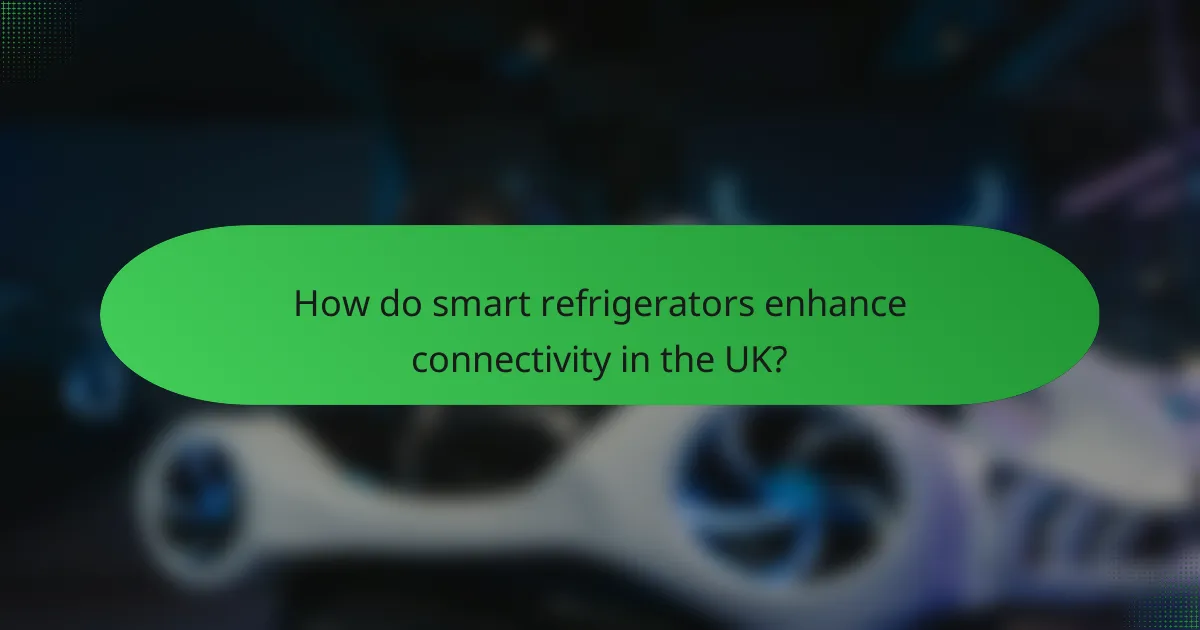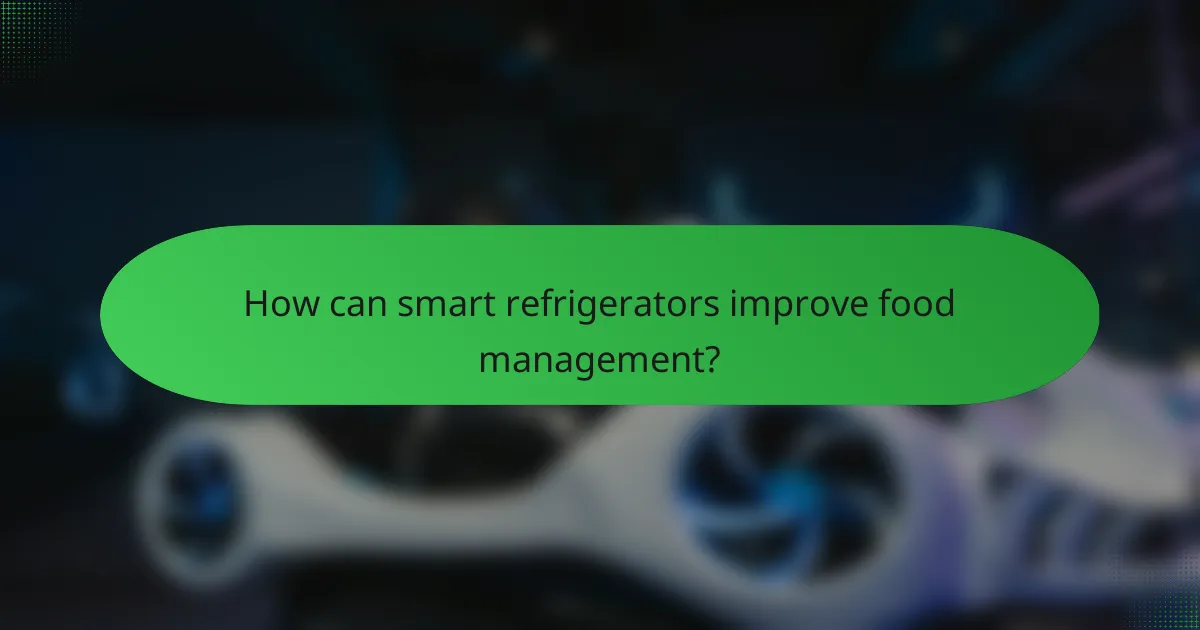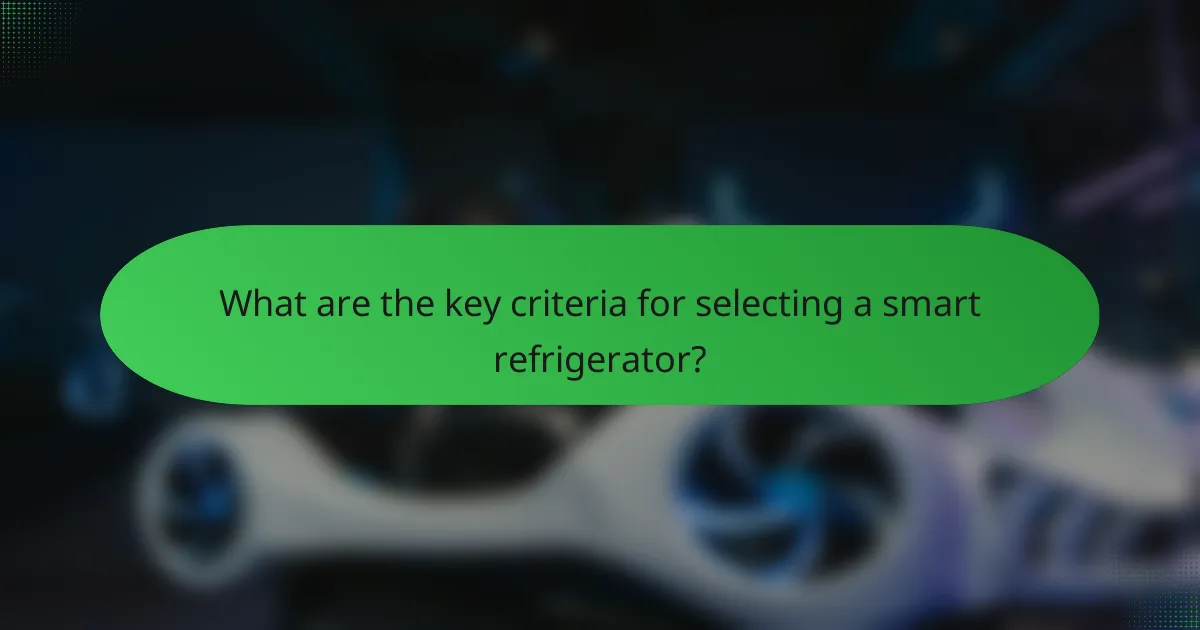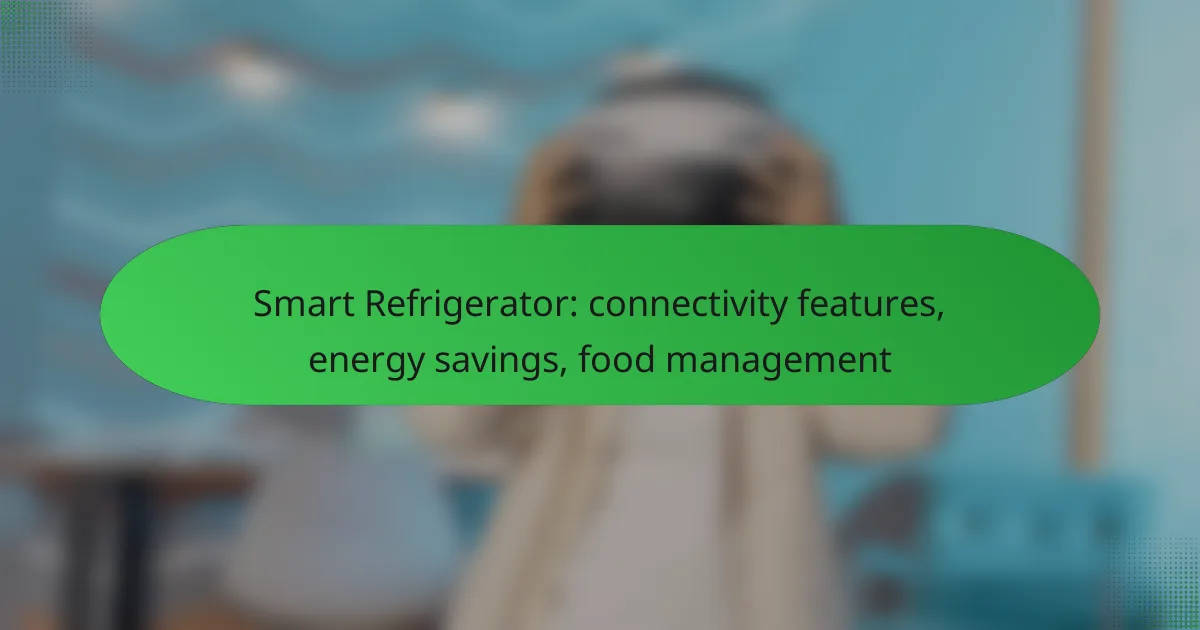Smart refrigerators are revolutionizing kitchen management by integrating with home networks, enabling remote control and monitoring. With energy-saving technologies, they not only lower utility bills but also promote sustainability. Additionally, their advanced food management features help track inventory, remind users of expiration dates, and suggest recipes, ultimately reducing food waste and enhancing meal preparation efficiency.

How do smart refrigerators enhance connectivity in the UK?
Smart refrigerators in the UK enhance connectivity by integrating with home networks and devices, allowing users to manage their appliances remotely. This connectivity facilitates energy savings, food management, and overall convenience in daily life.
Wi-Fi and Bluetooth integration
Smart refrigerators typically feature Wi-Fi and Bluetooth capabilities, enabling them to connect to home networks and other devices. Wi-Fi allows for remote monitoring and control, while Bluetooth can facilitate direct connections with smartphones or tablets for quick access to features.
With these integrations, users can receive alerts about temperature changes, energy usage, or even when groceries are running low. This connectivity ensures that the refrigerator operates efficiently and helps prevent food spoilage.
Smart home compatibility
Many smart refrigerators are designed to be compatible with popular smart home ecosystems, such as Amazon Alexa or Google Assistant. This compatibility allows users to control their refrigerators using voice commands, making it easier to manage tasks hands-free.
For example, users can ask their smart assistant to check the contents of the fridge or adjust the temperature settings. This integration not only enhances convenience but also contributes to a more cohesive smart home experience.
Mobile app control
Mobile apps are a key feature of smart refrigerators, providing users with a user-friendly interface to manage their appliance from anywhere. Through these apps, users can monitor energy usage, track food inventory, and even create shopping lists based on what’s available in the fridge.
Many apps also offer features like recipe suggestions based on ingredients in the refrigerator, which can help reduce food waste. Users should ensure their refrigerator’s app is regularly updated to access the latest features and improvements.

What energy-saving features do smart refrigerators offer?
Smart refrigerators provide various energy-saving features designed to enhance efficiency and reduce electricity consumption. These technologies not only lower utility bills but also contribute to a more sustainable lifestyle.
Energy-efficient cooling technology
Energy-efficient cooling technology in smart refrigerators often includes advanced insulation and compressor systems that minimize energy use while maintaining optimal temperatures. Many models utilize inverter compressors that adjust their speed based on cooling needs, leading to significant energy savings compared to traditional units.
Additionally, features like LED lighting and high-efficiency fans help distribute cool air evenly, further enhancing energy efficiency. When shopping, look for models with Energy Star ratings, which indicate compliance with energy efficiency guidelines.
Adaptive temperature control
Adaptive temperature control systems in smart refrigerators automatically adjust the internal temperature based on the contents and external conditions. This means that if the door is frequently opened or if warm items are added, the refrigerator can compensate by working harder temporarily, then returning to energy-saving mode once stable conditions are restored.
Some models allow users to set specific temperature zones for different compartments, optimizing energy use based on the types of food stored. This feature not only saves energy but also helps prolong the freshness of food items.
Energy monitoring systems
Energy monitoring systems in smart refrigerators provide real-time data on energy consumption, allowing users to track and manage their usage effectively. Many models feature smartphone apps that alert users to unusual energy spikes, which can indicate issues like a malfunctioning door seal or overloading.
By understanding energy patterns, users can make informed decisions about their refrigerator settings and habits, potentially reducing energy costs by a notable percentage. Regularly checking these metrics can lead to better food management and energy savings over time.

How can smart refrigerators improve food management?
Smart refrigerators enhance food management by utilizing advanced technology to track inventory, remind users of expiration dates, and suggest recipes based on available ingredients. These features help reduce food waste and streamline meal preparation.
Inventory tracking systems
Inventory tracking systems in smart refrigerators monitor the items stored inside, providing an up-to-date list of available food products. This feature often includes a digital display or a mobile app that shows quantities and types of food, making it easier to plan meals and grocery shopping.
Some systems can even alert users when they are running low on certain items, allowing for timely restocking. This proactive approach can help prevent last-minute grocery runs and ensure that essential ingredients are always on hand.
Expiration date reminders
Expiration date reminders are a critical feature of smart refrigerators, helping users keep track of when food items will spoil. Many models allow users to input expiration dates manually or automatically detect them through barcode scanning.
These reminders can be sent via notifications to a smartphone or displayed on the refrigerator’s screen, prompting users to consume items before they go bad. This feature significantly reduces food waste and encourages better meal planning.
Recipe suggestions based on ingredients
Smart refrigerators can suggest recipes based on the ingredients currently stored inside, making meal preparation more efficient. By analyzing the inventory, these systems can recommend dishes that utilize what you already have, minimizing the need for additional shopping.
This feature often includes a variety of cuisines and dietary preferences, allowing users to explore new recipes while ensuring they make the most of their existing food supplies. It can also help families with diverse tastes find common ground in meal choices.

What are the key criteria for selecting a smart refrigerator?
When selecting a smart refrigerator, consider connectivity options, energy efficiency ratings, and food management features. These criteria will help you choose a model that enhances convenience, reduces energy costs, and optimizes food storage.
Connectivity options
Smart refrigerators typically offer various connectivity options, including Wi-Fi, Bluetooth, and sometimes even cellular connectivity. Wi-Fi allows you to connect the fridge to your home network, enabling remote access via a smartphone app.
Look for features like compatibility with smart home systems, such as Amazon Alexa or Google Assistant, which can enhance your kitchen’s automation. Ensure the refrigerator has a user-friendly interface for easy control and monitoring.
Energy efficiency ratings
Energy efficiency is crucial when selecting a smart refrigerator, as it impacts your utility bills. Look for models with an Energy Star rating, which indicates they meet energy efficiency guidelines set by the U.S. Environmental Protection Agency.
Consider the estimated annual energy consumption, typically measured in kilowatt-hours (kWh). A more efficient model can save you a significant amount over its lifespan, often ranging from 10% to 50% less energy compared to standard models.
Food management features
Food management features in smart refrigerators can greatly simplify meal planning and reduce food waste. Look for options like internal cameras that allow you to check inventory remotely or expiration date tracking that sends alerts when items are nearing spoilage.
Some models offer recipe suggestions based on the ingredients you have, making meal preparation easier. Additionally, features like adjustable shelving and temperature zones can help optimize food storage based on your needs.

What are the leading brands of smart refrigerators in the UK?
The leading brands of smart refrigerators in the UK include Samsung and LG, known for their advanced connectivity features, energy efficiency, and food management capabilities. These brands offer models equipped with technology that enhances user experience and optimizes food storage.
Samsung Family Hub
The Samsung Family Hub is a standout in the smart refrigerator market, featuring a large touchscreen interface that allows users to manage groceries, create shopping lists, and even stream music. Its built-in cameras let you check the contents of your fridge remotely via a smartphone app, ensuring you never forget an item while shopping.
This model also integrates with smart home devices, enabling voice commands and automation. Samsung’s energy-saving features help reduce electricity consumption, making it a practical choice for eco-conscious consumers.
LG Smart Refrigerator
LG’s Smart Refrigerator offers innovative features such as the SmartThinQ app, which allows users to monitor and control the fridge from their smartphones. This app provides alerts for expired food items and helps manage inventory effectively, reducing food waste.
Additionally, LG refrigerators are designed with energy efficiency in mind, often meeting high energy standards. Their models typically include features like door-in-door access for easy retrieval of frequently used items, enhancing convenience in daily use.
